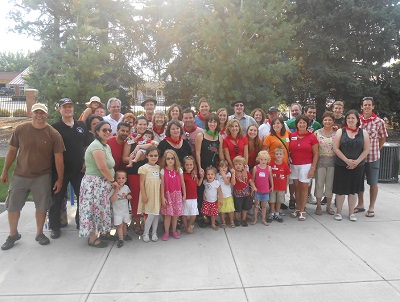basque heritage worldwide

09/10/2012

ADVERTISING
Vitoria-Gasteiz. Iñaki Goikoetxea and Mayte Galardi started their tour of workshops, Gurea 2012, organized by the Basque Government and NABO, in Denver, Colorado. From August 9-15 they had the opportunity to get to know the Colorado Basque club in situ, and live among its members. “It is a mall club, made up of descendants of Basques who worked as sheepherders in the area,” they explained. “Their biggest problem stems from not having a clubhouse, and the distances, because some of the members live two hours away by car.”
In Colorado they gave talks on the Basque Country and the Diaspora for adults and held game workshops with the kids. Additionally, on August 12, they participated in the club’s annual picnic that gathered nearly 100 people.
[Children from Colorado’s Basque club creating a mural of Picasso’s Guernica (photo Gurea Workshop 2012)]
From Colorado to California
More specifically to the Chino Basque club, one of the most dynamic clubs in the state that unites Basques in the Los Angeles area. There the graduate assistants gave talks and workshops for both adults and kids, as well as conducting a fun gymkhana on Euskal Herria, a game in which participants have to pass tests related to Basque culture. On August 19, they attended a Basque picnic that gathered nearly 1,000 people dancing to the music of the Behe Nafarroa group “Kantuz,” they said.
[Iñaki Goikoetxea and Mayte Galardi, at the Center with kids from Chino’s dance group (photo Gurea Workshop 2012)]
The last stage of the journey took them from one end of the country to another, specifically to the small state of Rhode Island. The local euskal etxea, Rhode Island Basque club, consists of pelotaris that work at the fronton in Newport and their families. “In Rhode Island there were nearly 200 pelotaris and the last fronton in Newport closed in 2003,” Goikoetxea explains. “There we gave talks on the country, and its culture since the majority was born here. However, we organized workshops, games, and fun gymkhanas for the kids at their picnic on August 25.”
“Thank God I’m Basque”
The trip left them with many anecdotes, “Basque is everywhere! In Chino we saw Ikurriñas on the houses and in the streets, along with the north American flag. Anyone can put what they want on their license plates: in California we saw, ‘Thank God I’m Basque’ and in Massachusetts ‘World’s Greatest Aita’ for example. “
[A Basque license plate in California (photo Gurea Workshop 2012)]
Their intention was to share and show elements of both traditional and modern Basque culture, but they both claim that they also learned. “We were able to see the contrast between the different euskal etxeak and their members. The older Basque worked mainly as sheepherders, born in the Basque Country that tried to maintain their culture there. Their children are Basque-Americans, who work hard to teach the culture to the grandchildren that live between two worlds.”
Both youth were impressed by the effort to keep and transmit the Basque culture: “We talked among ourselves that a Basque-American dantzari surely knows more dances and Basque Country traditions than 10 kids from there. How is it that our culture is appreciated more outside of Euskal Herria than here,” they wonder.
ADVERTISING
ADVERTISING
ADVERTISING
ADVERTISING
ADVERTISING
© 2014 - 2019 Basque Heritage Elkartea
Bera Bera 73
20009 Donostia / San Sebastián
Tel: (+34) 943 316170
Email: info@euskalkultura.eus